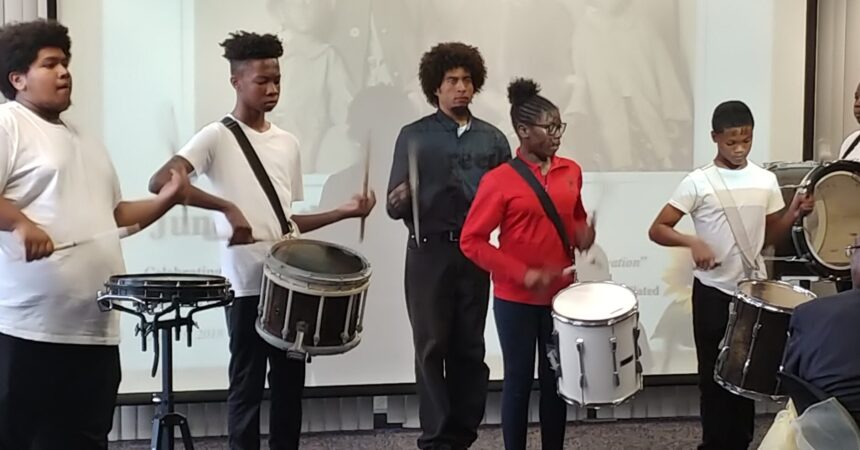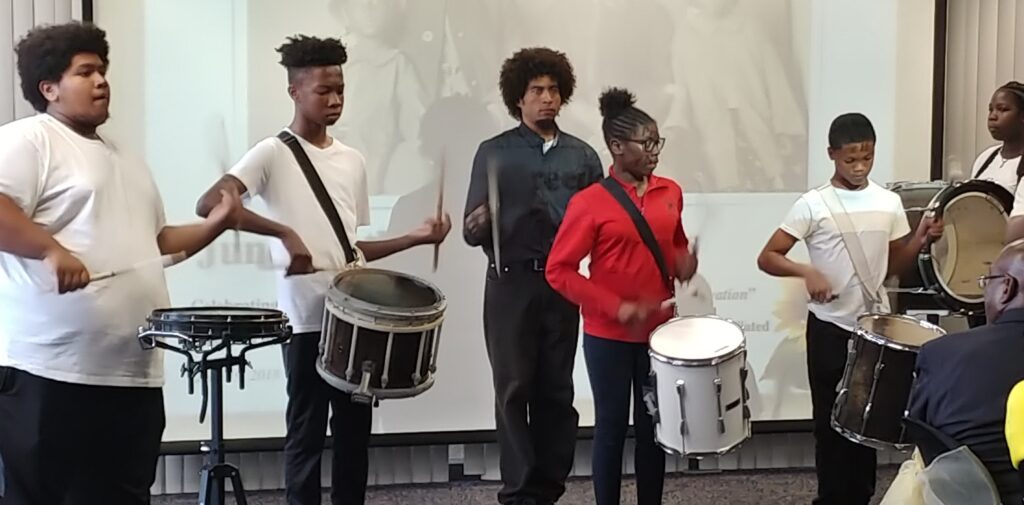
Analysis
Why is a Texas holiday on the verge of becoming a Florida holiday, and possibly a National holiday?

Photo by St. Clair Murraine
By Althemese Barnes
and Bob Holladay
We’re proud of being Floridians. We have the beaches; we have the weather; we have the history. In all three, Florida is second to none. Which is why it is both curious and perplexing that there is proposed legislation, Senate Bill 490 and House Bill 185, to create a state holiday out of an historical event that happened in Texas – Not in Florida.
The event would be “Juneteenth”, which commemorates June 19, the date in 1865 when enslaved persons in Texas, at the end of the Civil War, learned they were free. Now we all know and love Texas. It’s big, it’s brash, and it knows how to sell itself. Juneteenth is a catchy name, and Texas has managed to promote it over the years to national fame so that one of the members of the Texas congressional delegation has even filed a bill to make it a federal holiday.
While Juneteenth is fine for Texas, it is not for Florida where Emancipation occurred and for 156 years has been commemorated on May 20. On that date, General Edward McCook and a contingent of the United States Colored Troops rode into Tallahassee, and read the Emancipation Proclamation as an enforcement document for seven states that were still in rebellion and holding slaves even after the signing of the Emancipation Proclamation by President Abraham Lincoln on Jan. 1, 1863. Since that date, primary source news clips and other evidentiary documents confirm that cities from West to Southern parts of in Florida have commemorated and celebrated May 20 as Emancipation Day.
In early years, Black schools closed on that day so that the students could join their parents for celebrations. As a child, while attending Griffin High School (K-12) in Tallahassee, Althemese Pemberton Barnes recalls vividly the May 20 holiday and returns to the country with her parents, Mary and Mose Pemberton, to join other freed slaves descendants in the 20th of May celebrations. Many Black workers took the day off to attend. In the mid 20th Century, when African American schools began to receive some financial support from the school district, Barnes recalls, the school holiday ceased but the celebrations continued, attended by the children after school. So, making Juneteenth a Florida holiday is incongruent and non-sensible to those who lived it, have studied that history or have reason to know through other means of interaction or intellectual engagement, including reading and speaking with others, about this significant history.
Pausing from the historically correct Florida Emancipation Day, and directing an eye toward the framework of a National Emancipation Holiday, our suggestion, based on historical fact, is that a National Emancipation Day should more appropriately be based on the key events that ended slavery in America: either the date of Dec. 6, 1865, the date on which the 13th Amendment was ratified ending the system of slavery in America, or Jan. 1, 1863, the date that the Emancipation was signed by President Lincoln bringing about the “dawning of a new day” that put in motion the end of slavery.
While our efforts have failed with the sponsors of SB 490 and HB 195 to take this approach, preferring instead to push for declaring June 19 a Florida paid holiday for all branches and agencies of state government, there are cities and counties across Florida, once being made aware or reminded, are passing governmental resolutions in their communities to make May 20 the day to commemorate and celebrate the freeing of slaves in Florida. Claiming that “public opinion” and legislative leadership is squarely on their side, framers of the Bill forge ahead to gain approval of Juneteenth as the day when ALL slaves and those in Florida were freed, and thus the holiday on June 19. What public opinion? Who polled the public on this? We haven’t seen anything about it (the polling).
We happen to believe that in the study and memorializing of history, accuracy matters. Juneteenth is a cool name. The late novelist Ralph Ellison (from Oklahoma) even left an unfinished manuscript when he died called “Juneteenth.” But just as the good people of Delaware do not try to celebrate Mardi Gras, the good people of Florida have no reason to celebrate Juneteenth, the date when General Granger went into Galveston Texas and read the Emancipation Proclamation as an enforcement order, thus bringing about the release of slaves in Texas. The states of Delaware and Kentucky were the last two states to release their slaves. There were a number of slave states to which the Emancipation Proclamation did not apply: Tennessee, for example, which was occupied by federal troops early in the war, and Missouri, Kentucky, Maryland and Delaware. Some did not release their slaves until the end of 1865, and some even later.
So emancipation, and how it is commemorated, becomes a state issue. Dare we say that it’s a “states rights” issue, and one size does not fit all? But history is definitive and should remain so. We don’t know if HB 185 and SB 490 will pass this session or not. Our preference is to correct the Bills, or not pass them and give a period for statewide education notification and indoctrination period. We do feel strongly that it should not be passed and for the reasons given inaccurate history; and historical truth matters. A historically correct date to honor the emancipation of enslaved people in our nation can serve as such great healing power for people in our country and is an action overdue. It can be a day for everyone to come together, to reflect, share memories and history, appreciate how far we have come and plan and prepare for how far we have yet to go. But, it needs to be done with accuracy.
If asked to suggest a date for a National Holiday, we suggest Jan. 1, 1863, a date that Frederick Douglas said “should be remembered as if it was a thousand years.” On that date, the bell rang, and plantation doors began to open. This should be the impetus for the much talked about National Freedom Day Holiday across the United States. The night before Jan. 1, Frederick Douglas and others gathered in Boston on New Year’s Eve “to watch for the dawn of a new day.” This suggests that Watch Night, observed in many Black communities through the years, may be the oldest continuing celebration of emancipation. The next day, Jan. 1, 1863, word arrived that Lincoln had signed the Proclamation; there was great joy and jubilation. Frederick Douglass called the proclamation “a momentous decree.” A Maryland slaveholder said that “news of Mr. Lincoln’s proclamation struck the nation like a thunderbolt from a cloudless sky”; an elderly preacher sang “sound the loud trumpets over Egypt’s Red Sea, Jehovah has triumphed, His people are free; One person warned “may God forget my people – if they forget this day.” While all slaves were not freed on January 1, 1863, in spite of its nuances it was indeed Lincoln’s Proclamation that unlocked slavery’s door and in doing so tilted the moral arc toward freedom.
And so, we come to this day… and Senate Bill 490 and HB 185 filed by Senator Randolph Bracy and Representative Travarius McCurdy.
Freedom from slavery was not a simple event. Rather, emancipation was greatly influenced by the Civil War causing the slaves to be set free on different dates in different places, and under varying circumstances. Important is the fact that until slavery was abolished, it was not possible for this nation to live out its creed of proclaimed liberty. Along with the Declaration of Independence and the Constitution, the Emancipation Proclamation is that proverbial third leg that makes up freedom’s foundation. Until that day, Emancipation, Jan. 1, 1863, Frederick Douglas said “there stretched away behind us an awful chasm of darkness and despair of more than two centuries; the American slave, bound in chains, tossed his fettered arms on high and groaned for freedom’s gift in vain; the colored people of the United States lived in the shadow of death and had no visible future; it was doubtful whether liberty and union would triumph, or slavery and barbarism; victory had largely followed the arms of the Confederate army; the mighty conflict between the North and the South appeared to the eye of the civilized world as destitute of qualities.
Our hope, for the benefit of our children and adults, is that the focus will be on the fact – that the subject is freedom from slavery, a process that though highly convoluted was more than a day of dance, picnics, festival and compensation. In finality, When all is said and done, The desire is that history will guide decisions made observances of the freeing of the slaves in Florida, and America, will be fact-based and that history and reasoning will guide final legislative processes and decisions. Due to the effects of the war, and Emancipation as a process, there is no single date on which ALL slaves were freed. In Florida, it was May 20, 1865.
Althemese Barnes is founder and director emeritus of the John G. Riley House and Florida African American Heritage Preservation Network. Bob Holladay is president of the Tallahassee Historical Society.







